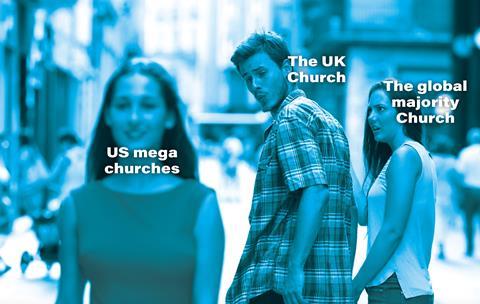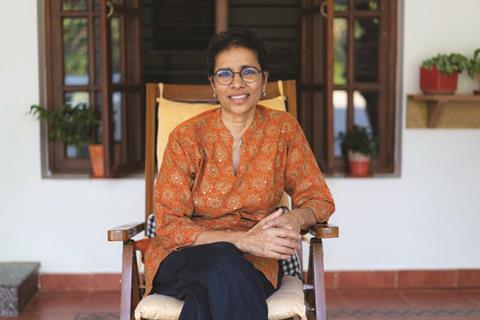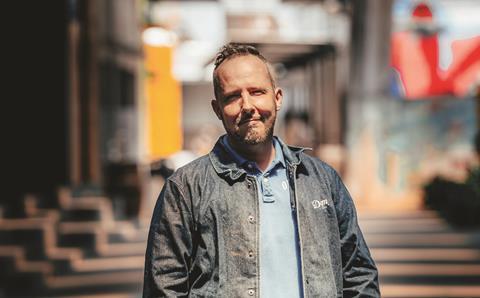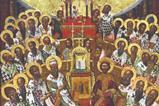The problem with Christianity in the UK is that we’re looking in the wrong direction, says Nick Page. It’s time to stop assuming our brothers and sisters across the pond have all the answers, and look to the example of Christians in the Majority World
Christianity in the UK is in decline. If that comes as a surprise to you then, firstly, I apologise for being the one to break the bad news. And secondly, maybe you should get out more. Over the past decade, 3,500 churches have been closed. Denominations are declining and most congregations are ageing. The 2021 census revealed that fewer than half of people in England and Wales identified as Christian. And while attendance in the Anglican church increased slightly last year, it is still way below pre-pandemic levels. I know there’s been talk of a ‘quiet revival’, but frankly, it’s so quiet that you’d hardly notice it was there. It will certainly have to get a lot noisier before it changes the direction of decline!
But we don’t have to get all depressed and despairing about this. And in this article, I don’t want to waste time arguing about the reasons, which are many and complex. All I’m trying to do is point out that the spiritual landscape of our country has changed. If trends continue, Christianity will become more and more marginalised in our society. We will increasingly be outsiders. Strangers in a strange land.
So, what do we do? What models do we follow? Where do we look for help?
For years, the Church in the UK has taken much of its counsel and inspiration from the US. American leaders and teachers dominate our bestseller lists. We have imported many training programmes and church growth models from across the Atlantic. The YouTube channels and podcast charts are full of perma-tanned mega-pastors with comforting messages and great dental plans. But here’s the thing: the American Church is also struggling. Compromised by wealth, politics and power – and beset by scandal – many denominations seem to be in decline. Church attendance has dropped by twelve per cent in the past 20 years. And more and more Americans are identifying with the ‘nones’ – people of no religious affiliation.
Old models and approaches are not going to serve us in this next stage of Christendom. We’ve been there, done that and sung the worship songs. If we want to learn how to live as a minority, then I suggest that we need to look in the other direction: not to California, but to China; not to Seattle, but to sub-Saharan Africa; not Central Park, but Central Asia. Perhaps it’s time to stop looking for answers in North America and start paying attention to Christians in North Korea.

Learning lessons
Seventy years ago, in 1955, a man called Andrew went to Poland. There, behind the Iron Curtain, he discovered Christians living under surveillance, oppression and persecution. ‘Brother Andrew’ went on to found Open Doors, an organisation dedicated to strengthening and supporting the persecuted Church.
Over the years, a great many people have joined in with its work, including myself. I spend some of my time working with Open Doors, and it’s that connection which is helping me discover models of faith to encourage us in these changing times. After all, if anyone is an expert on living in places where Christianity is viewed as outlandish or suspicious, it’s surely the persecuted Church.
Recently, I collaborated with my colleague, Eddie Lyle, on a book called Witness (Open Doors). It is about learning to live for Jesus in a society where, increasingly, Christianity is seen as marginal, weird or even downright offensive.
The history of Christianity in the West shows the futility of trying to grasp the levers of power
I want to be clear: I do not believe we are facing persecution in our country, at least, certainly not to the extent it’s faced elsewhere in the world. We might endure opposition or ridicule. But there are no secret police in unmarked cars waiting outside our churches and we can all own a Bible without being arrested. So the situation faced by Christians in countries such as China or North Korea is clearly very different to ours. But there is still much that we can learn by looking at their lives and listening to their stories.
Revaluing Church
Hae Woo spent five years in a North Korean labour camp. North Korea is the worst place on earth to be a Christian, and the labour camps are the worst places in North Korea. Yet, even in that hellish place, she went to church. She set up a secret meeting in the toilets – a place so disgusting that even the guards wouldn’t enter. There, she and a handful of other secret believers would whisper hymns, recite scripture from memory and pray together.
Looking at the persecuted Church reminds me that gathering with other Christians is vital. In our individualistic culture, church has become a product, an optional consumer choice. If it isn’t working, we do something else. But persecuted Christians yearn for it. Isolation is one of the hardest burdens they have to bear. Such is their commitment and desire to meet that, in many places, they will risk attack and violence to come together.
Church can look like many things. In some Central Asian countries where Christians are unable to meet openly, they meet in coffee shops to quietly discuss their faith and pray, open-eyed, while pretending to have coffee. So, this is not about specific models of church; we don’t have to carry on with church as we’ve always done it – indeed, we may not be able to. But looking at the persecuted Church encourages me to keep connected and keep meeting, because discipleship is a community activity and, in hard times, we need each other.
Rereading the Bible
When Brother Andrew went behind the Iron Curtain, he discovered the scarcity of Bibles. So, he became ‘God’s Smuggler’, sneaking contraband Bibles across borders. It’s a work that continues to this day, because persecuted Christians remind us of the importance of scripture. They live and breathe it.
I visited a safe house in one African country that offered sanctuary to believers whose lives were endangered. But it wasn’t just accommodation: it was training; these people were being prepared to go back into society as disciples of Jesus. Key to this was learning the Bible. And I really mean learning it. One group started to recite the verses they had memorised that morning. Five minutes later they were still going.
Look the wrong way and we see the Bible as a product. Something we own. We proliferate translations and editions. We mine it for proof verses with which to attack fellow Christians. Looking to the persecuted Church reminds me that scripture is more basic – and far more vital – than that. It is an oxygen tank. It is life support. We need to be more scriptural, not less.
Reframing leadership
A former colleague at Open Doors used to challenge us with this simple question: “Are we prepared to serve and be forgotten?” Honestly? I don’t know. A bit, maybe. As a writer, I’m deeply aware that I’m a strange mix of insecurity and ego. I’ve never felt that great about any of my books, but I still want my name on the spine…
Our culture has bought into a model of church leadership that is based largely on the Western business CEO – and heavily focused on numerical growth. May I suggest that perhaps it’s not currently going so well. Leadership is one area where the Church in the West has been haemorrhaging credibility.
Of course, power can be abused anywhere. But in places where leading a church can get you imprisoned, well, let’s just say it’s not the most obvious career move for those looking for fame, fortune or influence. The leaders I have encountered in the persecuted Church focus on relationship – and on real, everyday discipleship. Leadership is about service, sacrifice and preparing people for suffering.
The amazing thing is that church growth follows. While writing Witness, Eddie Lyle met a Chinese church leader who, when pressed, said that he had planted more than 290 churches. “The thing is,” says Eddie, “I never knew his name. I will never know his name. He’s invisible.”
Invisible leadership is not glamorous. It won’t get you a TED talk or book deal. Its principles are humility and service. We need a lot more incognito leaders.
Rediscovering mission
I grew up in a church where every week seemed to bring a new way to do mission and evangelism. There were endless courses and handbooks. But as far as I can recall, no one ever suggested just doing the obvious, ie being more like Jesus.
I’m certainly not against courses and training. But the persecuted Church reminds us that it’s not about techniques and theories: it’s about patient, persevering, living discipleship.
Patient perseverance was the superpower of the early Church. Paul writes: “Be joyful in hope, patient in affliction, faithful in prayer” (Romans 12:12). The writer of Hebrews called on Christians “to imitate those who through faith and patience inherit what has been promised” (Hebrews 6:12). The early Church had no political or economic power. They couldn’t even preach openly. So, instead, they lived out their message. As one of the early Church leaders in Roman North Africa put it: “We do not speak great things, but we live them.”
Leadership is one area where the Church in the West has been haemorrhaging credibility
This is something we will need to learn. As our power and influence dwindles, our lives will need to witness to our faith. Our patience will need to increase. It’s amazing how powerful patient endurance can be.
A persecuted Christian from Central Asia told me about a pastor he knew who was sent to prison. “The guards didn’t beat him,” he said, “because they thought he was ‘too far gone’ as a Christian.” Clearly, they felt he could not be convinced to renounce his faith. Instead, they put him in a cell with an extremist radical Muslim. There was no way he would survive that – or so they thought. But three days later, the radical Muslim accepted Christ. So, they put the pastor into solitary confinement, confident that a long spell would break him. It did not. Eventually, when the pastor was released, the governor took him aside and asked him for a Bible. “Could you give me your book?” he asked. “I want to understand why you have this nature – why you are so brave.”
Perseverance is brave. And we will, increasingly, need to be brave. It takes courage to live as a disciple of Jesus. The history of Christianity in the West shows the futility of trying to grasp the levers of power. Instead, we need to learn from the powerless and embrace the steady, irresistible force of Christ-likeness.
Looking to Jesus
Like all of us, persecuted Christians are human beings full of frailties and fears. I don’t want to turn them into saintly superheroes. But in a society awash with fear and anxiety, and splintered with hatred and division, we need to look to people who have taken their frail humanity and supercharged it with faith.
I don’t think we should obsess about the numbers attending (or not attending) church. And I don’t think we should worry about opposition. Even if numbers are falling and churches are closing, I am more optimistic about real discipleship in the UK and Ireland than I have ever been. Because, for the first time in around 1,600 years, going to church is a countercultural thing to do. We are becoming outsiders again – and that brings enormous opportunities. A lot of church models seem to be all about making Christianity interesting or Jesus relevant, but outsider Christianity will take care of all that. Countercultural faith is more attractive, not less. There’s a reason why the Church in Iran is believed to be one of the fastest growing in the world.
In the end, of course, it’s not where we look, but who we are looking at. Ultimately, it’s all about Jesus and our decision to follow him. The Open Doors trauma centre in Nigeria offers healing and hope to women who have suffered unimaginable abuse and violence. Together they find the strength to carry on and the power to forgive. The song they sing is an old classic, which we could all do with getting in tune with: “I have decided to follow Jesus. No turning back. No turning back.”
Witness: Sharing the faith of the persecuted Church, by Nick Page and Eddie Lyle is available free from opendoorsuk.org/witness
Looking beyond
- To find out more about the persecuted Church, you can connect with Christian charities such as Open Doors (opendoorsuk.org), Release International (releaseinternational.org) or Christian Solidarity Worldwide (csw.org.uk).
- The Langham Partnership have a podcast and YouTube series, ‘On Mission’, in which theologian Chris Wright speaks to Christian leaders from across the majority world: us.langham.org/global-resources/podcast
- Struggling with how to define what the majority world even is? Watch this short video from the Lausanne Movement: lausanne.org/video/what-is-majority-world
- I also recommend When Christians face Persecution (Apollos) by Chee-Chiew Lee. This book explores how the authors of the New Testament understood persecution, how they responded and what that means in our contemporary context.
Here are four voices from outside the UK and US, which the Premier Christianity team have come across:

Charbel and Giovanni Lteif (Lebanon)
Twin brothers Charbel and Giovanni Lteif are just 20 years old but their Instagram account is followed by more than 600,000 people. They started it in 2023 to address what they saw as a need for the Eastern Christian community to be more visible and engaged. Their content ranges from coverage of persecution in the Middle East and Africa to videos exploring Orthodox and Eastern Christian traditions – from feast day celebrations and marches in Jordan, Iraq and Lebanon, to footage of the sacred sites and historic churches central to their spiritual heritage. Follow them on Instagram @eastern_christians

Dr Havilah Dharamraj (India)
Havilah Dharamraj is head of biblical studies at the South Asia Institute of Advanced Christian Studies in Bangalore, India. Passionate about helping South Asian leaders understand scripture in their own cultural context, she was an editor and contributor to the South Asia Bible Commentary (Zondervan). Her commentary Ruth (Langham Global Library) presents the book through a distinctly Asian lens “that helps bring out the nuances of this Old Testament text that are often missed or misunderstood”. Dharamaj is also an international speaker, often teaching on women in the Old Testament.

Craig Greenfield (New Zealand)
Originally from New Zealand, Craig Greenfield left a life of affluence to live in the slums of Cambodia. There, he and his wife began walking alongside vulnerable children. Realising they couldn’t reach everyone alone, they launched Alongsiders International – a youth discipleship movement that is now in 30 countries across Asia, Africa and Europe. It equips young Christians to disciple one vulnerable child each from their own community. Craig’s book Subversive Mission (IVP) calls for outsiders in cross-cultural ministry to serve humbly under local leadership. Find more about at craiggreenfield.com







































No comments yet